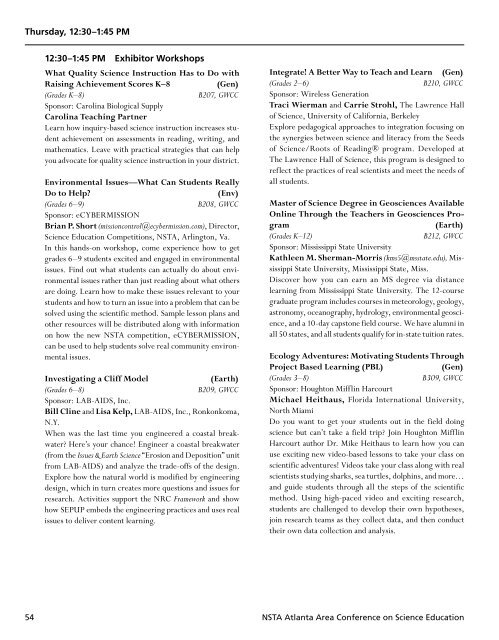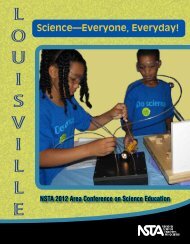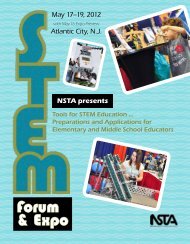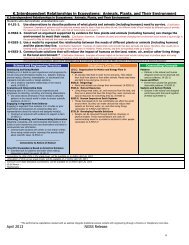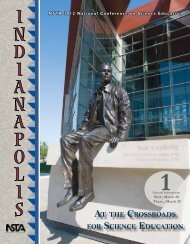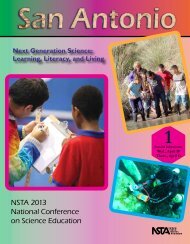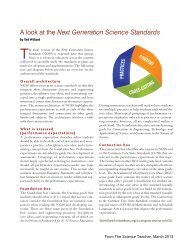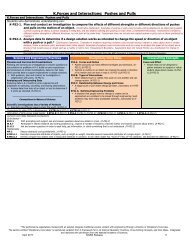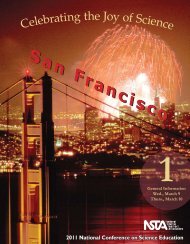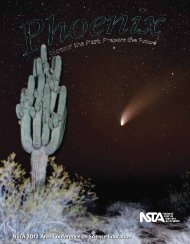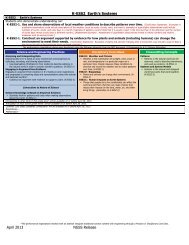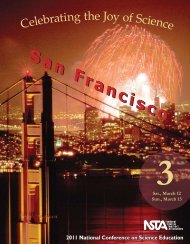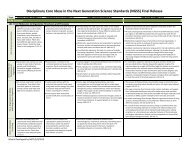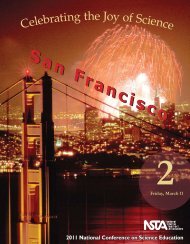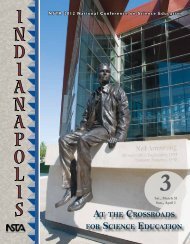Atlanta Conference Program
Atlanta Conference Program
Atlanta Conference Program
You also want an ePaper? Increase the reach of your titles
YUMPU automatically turns print PDFs into web optimized ePapers that Google loves.
Thursday, 12:30–1:45 PM<br />
12:30–1:45 PM Exhibitor Workshops<br />
What Quality Science Instruction Has to Do with<br />
Raising Achievement Scores K–8<br />
(Gen)<br />
(Grades K–8)<br />
B207, GWCC<br />
Sponsor: Carolina Biological Supply<br />
Carolina Teaching Partner<br />
Learn how inquiry-based science instruction increases student<br />
achievement on assessments in reading, writing, and<br />
mathematics. Leave with practical strategies that can help<br />
you advocate for quality science instruction in your district.<br />
Environmental Issues—What Can Students Really<br />
Do to Help<br />
(Env)<br />
(Grades 6–9)<br />
B208, GWCC<br />
Sponsor: eCYBERMISSION<br />
Brian P. Short (missioncontrol@ecybermission.com), Director,<br />
Science Education Competitions, NSTA, Arlington, Va.<br />
In this hands-on workshop, come experience how to get<br />
grades 6–9 students excited and engaged in environmental<br />
issues. Find out what students can actually do about environmental<br />
issues rather than just reading about what others<br />
are doing. Learn how to make these issues relevant to your<br />
students and how to turn an issue into a problem that can be<br />
solved using the scientific method. Sample lesson plans and<br />
other resources will be distributed along with information<br />
on how the new NSTA competition, eCYBERMISSION,<br />
can be used to help students solve real community environmental<br />
issues.<br />
Investigating a Cliff Model<br />
(Earth)<br />
(Grades 6–8)<br />
B209, GWCC<br />
Sponsor: LAB-AIDS, Inc.<br />
Bill Cline and Lisa Kelp, LAB-AIDS, Inc., Ronkonkoma,<br />
N.Y.<br />
When was the last time you engineered a coastal breakwater<br />
Here’s your chance! Engineer a coastal breakwater<br />
(from the Issues & Earth Science “Erosion and Deposition” unit<br />
from LAB-AIDS) and analyze the trade-offs of the design.<br />
Explore how the natural world is modified by engineering<br />
design, which in turn creates more questions and issues for<br />
research. Activities support the NRC Framework and show<br />
how SEPUP embeds the engineering practices and uses real<br />
issues to deliver content learning.<br />
Integrate! A Better Way to Teach and Learn (Gen)<br />
(Grades 2–6)<br />
B210, GWCC<br />
Sponsor: Wireless Generation<br />
Traci Wierman and Carrie Strohl, The Lawrence Hall<br />
of Science, University of California, Berkeley<br />
Explore pedagogical approaches to integration focusing on<br />
the synergies between science and literacy from the Seeds<br />
of Science/Roots of Reading® program. Developed at<br />
The Lawrence Hall of Science, this program is designed to<br />
reflect the practices of real scientists and meet the needs of<br />
all students.<br />
Master of Science Degree in Geosciences Available<br />
Online Through the Teachers in Geosciences <strong>Program</strong><br />
(Earth)<br />
(Grades K–12)<br />
B212, GWCC<br />
Sponsor: Mississippi State University<br />
Kathleen M. Sherman-Morris (kms5@msstate.edu), Mississippi<br />
State University, Mississippi State, Miss.<br />
Discover how you can earn an MS degree via distance<br />
learning from Mississippi State University. The 12-course<br />
graduate program includes courses in meteorology, geology,<br />
astronomy, oceanography, hydrology, environmental geoscience,<br />
and a 10-day capstone field course. We have alumni in<br />
all 50 states, and all students qualify for in-state tuition rates.<br />
Ecology Adventures: Motivating Students Through<br />
Project Based Learning (PBL)<br />
(Gen)<br />
(Grades 3–8)<br />
B309, GWCC<br />
Sponsor: Houghton Mifflin Harcourt<br />
Michael Heithaus, Florida International University,<br />
North Miami<br />
Do you want to get your students out in the field doing<br />
science but can’t take a field trip Join Houghton Mifflin<br />
Harcourt author Dr. Mike Heithaus to learn how you can<br />
use exciting new video-based lessons to take your class on<br />
scientific adventures! Videos take your class along with real<br />
scientists studying sharks, sea turtles, dolphins, and more…<br />
and guide students through all the steps of the scientific<br />
method. Using high-paced video and exciting research,<br />
students are challenged to develop their own hypotheses,<br />
join research teams as they collect data, and then conduct<br />
their own data collection and analysis.<br />
54 NSTA <strong>Atlanta</strong> Area <strong>Conference</strong> on Science Education


